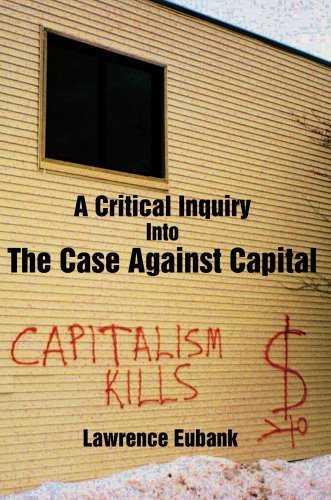Lawrence Eubank, A Critical Inquiry into The Case Against Capital,
iUniverse, New York, 480 pages, April 2005, ISBN 0-595-33754-6, $27.95
Karl Marx published Volume One of Capital
in 1867 and it became food and drink for those who implemented his prescriptions
at an appalling cost in human suffering in the 122 years until the fall of
Soviet Communism.
Capital is not easy reading. It is, in fact, incredibly
difficult. My tutor, ‘explaining’ its difficulty, said Karl Marx
suffered from carbuncles, a skin inflammation, which, apparently, ‘distracted’
him. But he could have rewritten the earlier chapters; he didn’t, therefore
I concluded he was deliberately obtuse and my tutor ‘misinformed.’
Lawrence Eubank gives a different, more credible reason for its difficulties:
Marx wrote a fantasy account of incredible arrogance which Eubank dissects
and exposes as a monumental fraud, based on metaphysical definitions and
sterile logic divorced from reality.
John Locke (Second Treatise on Government, 1690) identified labor
as a source of value from the ownership people had of their own bodies and,
therefore, products of their labor belonged to them by right. In primitive
societies this was probably true; the hunter enjoyed the ‘full fruits of
his labor,’ a senseless notion several millennia later. Co-operative
production uses far more complex ‘capital’ than bows and arrows. Today,
shared ownership of production dilutes Locke’s right of the laborer to the
‘full fruits of his labor.’
Adam Smith, following Locke, also alluded to a labor theory of value in
‘an early and rude state of society,’ but he went on to divide exchange value
into separate components (rent, wages and profit) in the complex commercial
market societies of 18th-century Britain.
The famous paradox of the exchange value of diamonds and water led him to
clarify one problem but caused others. In due course, economics moved
from the dead-end of a ‘costs of production’ theory of value to the idea
of relative scarcities, independent of both the labor content of output
and the cost of production. Goods have value whenever there is
excess demand at zero price; water, like the air we breathe, but unlike diamonds,
was not scarce even at zero price and, therefore, not in excess demand (though
in some parts of the world, water now faces localized excess demands, with
political as well as price implications).
Marx’s Capital sets out to ‘prove’ that workers are exploited by capitalists
by a ‘bourgeois’ deception, which Marx boldly ‘exposes.’ Eubank conducts
a detailed and exhaustive (and at times exhausting!) analysis with much repetition
(sometimes helpful, because he closely questions Marx’s reasoning) showing
that his theory of labor value is unbelievable and unscientific because
it cannot be tested or otherwise disproved.
By eliminating candidates for ‘value,’ Marx arrives at the labor contained
in the commodity. But not labor, as understood, observed or undertaken
by everybody else. Labor is the “mere congelation of homogeneous human labor”
(don’t ask!), something ‘congealed’ inside the commodity (‘crystallised’
even), though you cannot see, measure, or weigh it. Marx re-names labor
as ‘labor power,’ an equally vacuous concept. This re-wording enables
Marx to invent capitalist exploitation.
The capitalist pays by the hour for labor, or rather thinks he does.
The laborer sells and the capitalist buys 12 hours of labor a day (it’s
mid-19th-century Britain!) for a wage, equivalent to the amount of money
sufficient for the subsistence of the laborer and his family (society sets
norms of ‘subsistence’).
In reality (seen only by Marx solely via his definitions; the laborers remain
blind), the capitalist actually buys the laborer's ‘labor power,’ and this
produces output worth more than the value of his subsistence. The difference
between wages for hours worked and the output from his labor power, constitutes
the ‘surplus value’ secretly appropriated by the capitalist, the laborers
being too innocent to spot what is going on (until communist militants inform
and try to inflame them).
Out of the surplus value ‘stolen’ from the laborers, the capitalist pays
for raw materials bought from other capitalists, replaces depreciating machinery,
and pockets what’s left as his ‘profits.’ Because it is ‘theft’ --
though nobody, except Marx, is aware of ‘surplus value,’ presumably making
it difficult to steal -- the capitalist allegedly deserves nothing, disregarding
his contributions to the production of goods from his organization, risk
and capital to start and stay in business.
When capitalists are physically eliminated or flee for their lives in communist
revolution, their missing entrepreneurial contributions leave a void and
decline sets in, causing serious scarcities, deprivations, hunger and famines;
when punitive taxation has similar, though thankfully, lesser effects in
a capitalist economy, it shows in slowdowns, public and personal shabbiness
and an eventual electoral penalty on the government (where democracy survives).
Laborers are not liberated by Marxist revolutions (examples: Russia, China,
North Korea, Eastern Europe, Cuba, Nicaragua and, now perhaps, Venezuela).
Some militants manage to join the communist elite and work their way up it
(some get jailed or shot for ‘deviance’), but for the bulk of laborers,
no change for the better takes place. Commissars replace the capitalists
and the laborers continue working as before, without agitation from their
communist rulers about stolen ‘surplus value’ and their right to the ‘full
fruits of their labor!’ This mythical something (read ‘profits’) is
appropriated by the ‘workers state’ and anybody who does not acquiesce is
‘dealt with,’ ‘re-educated’ in labor camps, or denied all ‘privileges’,
i.e., the right to queue for their miserable rations.
Meanwhile, in capitalist countries, laborers' real wages continue to grow;
shops are full, rather than empty; their children are educated in freedom;
their teenagers are ‘troublesome’ but grow out of it; each generation becomes
better off than their grandparents, and (it is ever thus) they moan about
their lot and about government, but nobody kills them for doing so.
Back at the workplace, capitalists hire labor, machinery and materials, employees
add value to what they produce, capitalists add their hoped for, but never
guaranteed, profit and send it to market. To capitalists price is unit
cost plus profit, a simpler calculation than mystical ‘crystallised’ labor
power. Capitalists, however, do not set market prices.
Capitalists may set their prices a priori, but supply and demand in
competitive markets determines market prices, confirming capitalists’ pre-set
prices or substituting lower or higher market prices. Ultimately, consumers
pay capitalists’ profits in the prices they pay for the products sold to
them. Profit is not the ‘exploitation’ of the laborers, a scanty source
of profit in processes where labor is a small fraction of unit costs!
Competitive markets always triumph over pre-set prices, which is why some
capitalists try to eliminate competition by forming monopolies. Adam
Smith railed against the monopolizing practices of ‘merchants and manufacturers.’
If market prices are higher than costs, capitalists make profits and continue
employing laborers, buying machinery and materials; if they are lower than
costs, capitalists makes losses and reduce their costs or go bust.
The laborers seek work elsewhere and the machinery, buildings and materials
are sold to other capitalists who believe (at their risk!) that they can
make better use of them in other businesses.
Lawrence Eubank shows how Marx’s theories of surplus value are built on thin
air. It is a readable account of those difficult early chapters in
Capital and the general reader will understand his text
without difficulty. Professional economists might lose patience, but
that is the economics profession; no willingness to explore new approaches,
and, given the demise of Soviet communism, no sense of urgency to understand
that which seems, for the moment, of little relevance.
Marxism may be a busted flush, the militants having moved on to anti-globalization,
global warming, and the environment, but their continuing assault on profitable
competitive markets, suggests these contests are far from over.
A Critical Inquiry into the Case Against Capital is available on Amazon.com.
Gavin Kennedy recently published Adam Smith's Lost Legacy. An economist by education, Professor Kennedy has taught in universities for thirty-two years.
Email Gavin Kennedy
Send
this Article to a Friend




